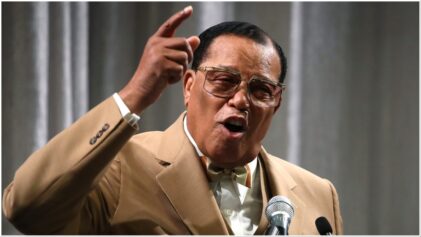
Some have called for Tamika Mallory’s resignation amid news of her vocal support of Minister Louis Farrakhan. (Photo by Rebecca Cook/Reuters)
A Women’s March co-founder is fending off waves of criticism after attending a fiery speech by Nation of Islam leader Louis Farrakhan, who railed against the Jewish community.
Activist Tamika D. Mallory is now facing calls for resignation from critics who accused her of supporting anti-Semitic sentiments after she attended the minister’s speech in Chicago late last month, the New York Daily News reported. In his address, Farrakhan reportedly flipped the “Time’s Up” phase, a slogan calling for an end to sexual harassment/abuse, against the “Satanic Jew.”
Mallory has repeatedly tried to explain her stance on the issue, taking to Twitter to make her case.
“I am and always have been against all forms of racism,” she wrote. “I am committed to ending anti-Black racism, antisemitism, homophobia & transphobia. This is why I helped create an intersectional movement to bring groups together.”
“I am a Black woman and a mother and while I do the hard work and learn along the way, I also won’t accept abuse and attacks,” she continued. “…I won’t stand for it because I don’t deserve it. I risk my life every day so my Black son & live freely and safely.”
Farrakhan’s remarks came during a Saviour’s Day speech, a day honoring NOI founder Wallace Fard Muhammad. In it, he reportedly claimed Jews controlled governments across the globe.
“When you want something in this world, the Jew holds the door,” he said.
Mallory’s attendance at the Savior’s Day speech and her past ties to Farrakhan have drawn the ire of the Anti-Defamation League, as well as fellow feminists. Still, Mallory maintains her goal was only to bring people together, not drive them apart.
“I am the same woman who helped to build an intersectional movement that fights for the rights of all people and stands against hatred and discrimination of all forms,” she wrote in an op-ed for NewsOne. “I’m the same person today that I was before Saviour’s Day, which begs the question – why are my beliefs being questioned now?”
“It is impossible for me to agree with every statement or share every viewpoint of the many people who I have worked with or will work with in the future,” Mallory added. “As I do not wish to be held responsible for the words of others when my own history shows that I stand in opposition to them, I also do not think it is fair to question anyone who works with me, who supports my work and who is a member of this movement because of the ways that I may have fallen short here or in any other instance.”
Some people remained unconvinced, however.
“It is impossible to imagine any other group being asked to tolerate seeing celebrities, public figures, and elected officials embrace a person who openly calls for their death,” Jonathan Greenblatt, National Director for the ADL, wrote in an op-ed published week.
Singer Regina Spektor, who performed at this year’s Women’s March, also expressed her disgust over the situation.
Hey @womensmarch organizers… What do you think? Farrakhan speaks despicable lies/how can you stand with him. Gross… 😔 https://t.co/zmANyY3SiJ
— Regina Spektor (@respektor) March 2, 2018
Still, there were those who defended the Black activist against online attacks and allegations of anti-Semitism.
https://twitter.com/SymoneDSanders/status/969666033995931649?ref_src=twsrc%5Etfw&ref_url=https%3A%2F%2Fwww.salon.com%2F2018%2F03%2F08%2Fthe-womens-march-has-an-anti-semitism-problem-and-a-louis-farrakhan-one%2F
https://twitter.com/ShaunKing/status/969705132421197825?ref_src=twsrc%5Etfw&ref_url=https%3A%2F%2Fwww.salon.com%2F2018%2F03%2F08%2Fthe-womens-march-has-an-anti-semitism-problem-and-a-louis-farrakhan-one%2F
In a statement, the Women’s March said Farrakhan’s statements does not reflect their views.
“We will not tolerate anti-Semitism, racism, misogyny, homophobia, and transphobia and we condemn these expressions of hatred in all forms,” their statement read. “We love and value our sister and co-President Tamika Mallory, who has played a key role in shaping these conversations. Neither we nor she shy away from the fact that intersectional movement building is difficult and often painful.”

